Under Peter, Westernization became irreversible.
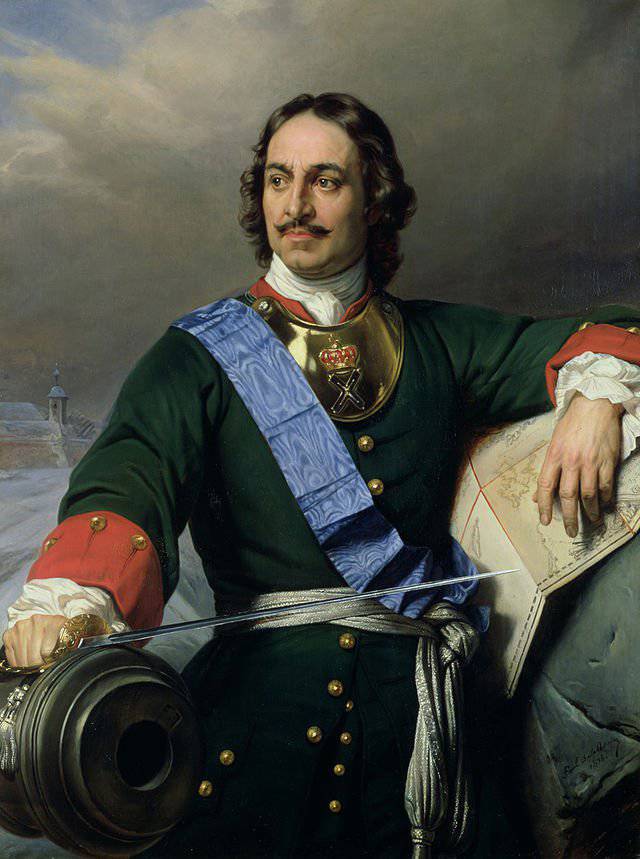
28 January (8 February) 1725 of the year, 290 years ago, died the last Tsar of All Russia and the first emperor of Russia, Peter I Alekseevich. With the reign of Peter begins a new, imperial, period of our stories. Peter Alekseevich restored the position of Russia in the Baltic States, showed the need for the return of the Northern Black Sea region and access to the Persian Gulf and India through the Caspian Sea (1722 — 1723 Persian campaign) and Central Asia, although he did not have time to complete this work. Tsar Peter carried out fundamental military reforms, finally creating a regular army and navy.
However, it is impossible to associate the name of Peter only with positive reforms. Peter “cut a window” to Europe and began a large-scale modernization of Russia in the European fashion, the westernization of the nobility (“elite”). This led to the division of the Russian people into two "people" - peasant Russia with the special world of the Old Believers and the Westernized "elite" who saw the best and "light of enlightenment" only in Europe. This split eventually became the main prerequisite for the 1917 disaster.
Petr Alekseevich Romanov was born on May 30 (June 9) 1672 in Moscow in the family of Tsar Alexei Mikhailovich (reigned in 1645-1676) and his second wife Natalia Kirillovna Naryshkina. The death of Tsar Alexei Mikhailovich led to the accession of his eldest son Fedor Alekseevich (from Tsarina Maria Ilyinichna, nee Miloslavskaya) and to the seizure of power by the Miloslavsky family. Peter's mother and her relatives, the Naryshkins, were relegated to the background, which became the cause of elite conflict. The village of Preobrazhenskoye, near Moscow, became the residence of Queen Natalia. This conflict predetermined the worldview of the future king. Peter did not receive a basic education that befits the future king of education, and in search of a different way of life, he made friends with foreigners, whom he began to trust more than his subjects.
27 April (7 May) 1682 of the year died painful Tsar Fedor Alekseevich. According to custom, the next son of Tsar Alexei and Tsarina Maria Ilyinichna, Ivan, was to receive the throne. But he was painful, incapable of ruling the country. According to some information, even the weak-minded, that, perhaps, this statement was the libel of the Naryshkins, who fought for power. With the support of Patriarch Joachim Naryshkins and their supporters proclaimed Tsar Peter. The Miloslavskys organized a rebellion of the archers. Some supporters of Peter were killed or fled. As a result, the eldest Ivan was recognized as the first king, and the younger Peter — the second. And Tsarevna Sophia Alekseevna became regent due to the early childhood of her brothers. Tsarina Natalia and Peter fell into disgrace and left the court.
Thus, the young and fragile Peter, before becoming the sovereign ruler, went a long way of intrigue, deception, conspiracy and insurrection. This became the basis for his negative character traits - hot temper, distrust, suspicion towards others, and general distrust towards the old Russian world. The fear experienced in childhood led to the development of "epileptic" (epileptic seizures). Peter became extremely cautious, trying to figure out his steps forward and anticipate impending dangers, and tried to control literally everything. Palace intrigues had a negative impact on his education. Peter received a poor basic education, and subsequently he had to compensate for this with rich practice.
Being out of work, Peter became interested in military, naval, artillery and fortification business. He personally tried to penetrate into all the details, study all the features of the studied specialties, was interested in science, which eventually made the young king a skilled practitioner and professional in his field. That was his positive side. Peter wanted to introduce Russia to the advanced achievements of European science, technology and military affairs.
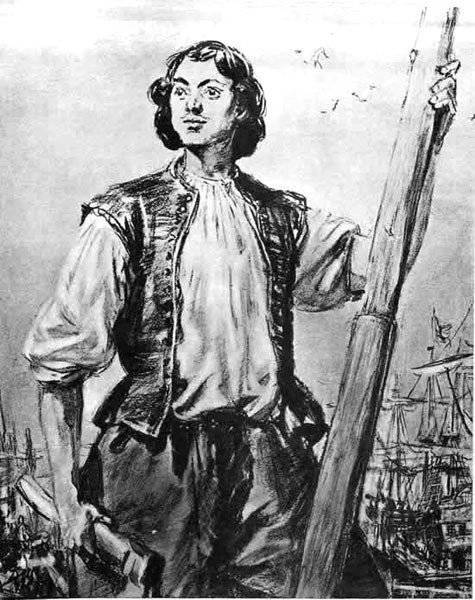
Peter the carpenter. Soviet graphic and illustrator Dementy Shmarinov
Not surprisingly, in such circumstances, Peter made a bid for foreigners. The German settlement, which was located not far from his palace in Preobrazhensky, became a home for Peter. His entourage included Franz Lefort, Patrick Gordon, Theodor von Sommer, Franz Timmerman, Carsten Brandt, and others. They created "amusing regiments" - Preobrazhensky and Semenovsky, which in the future became a real fighting force, bombardir company, where Peter was just a scorer , fortifications were built, exercises were held, etc. It is clear that foreigners used this to strengthen their influence on Petra. It is possible that among them were "agents of influence" of foreign powers, it was commonplace then, and now. In addition, Lefort planted his mistress, Anna Mons, the daughter of a German artisan, under Peter. The sovereign fell in love with a foreigner so much that he banished his legitimate wife Eudoxia to a monastery and even wanted to marry the Kukui queen (named after the German settlement, Kukuyu). However, the frivolous lady missed the chance to become a Russian queen. She cheated on the king when Peter found out about this, Mons was disgraced. Unfortunately, this did not improve the tastes of the king. Peter became interested in the former servant Martha Skavronskaya, who until then had been a litter of Sheremetev and Menshikov, and eventually became the Russian Empress Catherine I.
Communicating with foreigners, Peter gradually took over their lifestyle. Peter lit a German pipe, began to attend parties with dancing and drinking, free relations with Mons destroyed his family. One of the consequences of this was the discord in relations with his son, Tsarevich Alexei Petrovich, the sons of Evdokia Lopukhina. This eventually led to a personal tragedy - the cause of Tsarevich Alexei. Another negative consequence of a already global nature is the spread of the Western way of life among the nobility, and the general population (especially urban), including smoking, wider use of alcohol, the appearance of categories of women freed from the old morality, etc. The layering of the Western way of life on the ruling, the privileged strata of the population, with the preservation of patriarchal traditions among the masses of the people, led to the disorganization of Russian life and way of life. Part of the “elite” began to parasitize on the people, perceiving its parasitism as “innate elitism” “chosenness”.
Many people smile at shaving beards and dressing noblemen in European clothes. However, this is not the main thing. The king-reformer encroached on the foundations of being of the Russian civilization, its cultural code. Russian tried to perekovat in the European way. Western culture literally with an iron fist and whip was driven into Russia. The massacre of the archers, with the personal participation of Tsar Peter I, became a symbol of the crucified Russian culture and faith.
"Morning Streltsy penalty." Painting V.I. Surikov
Queen Sophia and her entourage made a number of mistakes, which ultimately led to the strengthening of the position of the Naryshkins. Therefore, Sofia's attempt to finally seize power in the 1689 year led to her defeat. Sophia was imprisoned in a monastery. Tsar Ivan V remained a senior king until his death in 1696, although he had no real power. Power passed into the hands of people who rallied around Queen Natalia Kirillovna. Peter initially showed indifference to state affairs. The rules are his mother and her government. Only after his mother died in 1694, Peter became the sovereign ruler.
Peter was more interested in military affairs and foreign policy. Peter I decided, instead of the campaigns to the Crimea that were undertaken during the reign of Sophia, to capture the powerful Turkish fortress of Azov at the mouth of the Don. This allowed the creation of a military flotillaestablish control over the Sea of Azov and opened up opportunities for continued expansion in the Northern Black Sea region. The first campaign of 1695 ended in failure. The second campaign of 1696 was better organized, the Turkish fortress was blocked not only from land, but also from the sea, depriving external support, which led to victory. During this campaign, Peter as soon as possible created a military flotilla. In the summer of 1699, the first large Russian ship “Fortress” took the Russian ambassador Emelyan Ukraintsev to Constantinople for peace talks.
Fragment of a diorama The capture of the Turkish fortress by the Azov troops of Peter I in 1696, Arseny Chernyshov
Peter wanted to continue the war with Turkey and achieve a full-fledged exit to the Black Sea, but the geopolitical situation did not contribute to such a war (the European powers were preparing for a fight for the Spanish inheritance). As part of the Great Embassy 1697-1698. Petr Alekseevich visited a number of European countries, conducting negotiations and studying the military-technical and scientific achievements of Europe. For service and work in Russia, several hundred specialists were recruited. The massive recruitment of foreign specialists, including military mercenaries, continued. In the course of this embassy, Peter saw that it was possible to return the lands previously belonging to Russia and in the sphere of its influence in the Baltic. There is a reorientation of the foreign policy of the Russian state from the south to the north.
Moscow begins preparations for a war with Sweden to return to the Baltic Sea. Sweden at that time was a real empire that turned the Baltic into a “Swedish lake” with first-class land and sea forces. For a war with such a strong enemy, allies were required. In 1699, the anti-Swedish Northern Union was created, which included Russia, Denmark, Rzeczpospolita and Saxony (the Saxon ruler Augustus II was also the Polish king). Thus began the Great Northern War, which will last for twenty one years.
The Russian Tsar-Reformer Peter I and the Swedish King Warrior Charles XII, who dreams of repeating the exploits of Alexander the Great, became the main characters of this war. As Peter himself said: "Brother Carl still dreams of being Alexander, but I am not Darius." At the same time, Peter himself was closer to Julius Caesar. The beginning of the war was unsuccessful for the Northern Union. The Swedish warrior king brought Denmark out of the war with a lightning strike and forced August II to retreat from Riga. The battle of Narva ended for the Russian army with a heavy defeat. I must say, Peter's hopes for foreigners in this battle did not justify themselves. The army commander, Duke de Croas, with his headquarters, also consisting of foreigners, surrendered to Charles XII before the decisive moment of the battle. At the same time, the Russian guard stood to death and retained the honor of Russia.
However, after this, the Swedish king Karl XII made a strategic mistake. Considering that the Russian state is no longer recovering, he turned his wrath on the Saxon Elector, pursuing him throughout the territory of the Commonwealth and in Saxony. This made it possible for Peter to restore the army and the artillery park, to carry out a radical transformation to create modern armed forces and a military-industrial complex. In the armed forces, national cadres began to crowd out foreign mercenaries. The Russian forces, in the absence of Charles and the battle core of his army, began to crowd the Swedes in the Baltic, seizing one position after another. Russian troops recaptured the mouth of the Neva and founded Petersburg in the 1703 year. In 1704, Russia controlled almost the entire territory of Ingermanlandia (Izhora land), Russian troops took Dorpat (Yuriev) and Narva. At the same time, Peter continued to support his Saxon ally with money and troops, delaying the war in Poland. In the end, Karl was able to force Augustus to conclude a peace agreement with Sweden. Russia was left alone, without allies.
As a result, when Karl realized his mistake and turned against Russia, trying to organize a campaign against Moscow, Peter had already “worked on the mistakes” and was ready for a new decisive battle. Karl’s attempt to create a broad coalition against Russia with the participation of Turkey, the Crimea, the Zaporizhia and Ukrainian Cossacks, led by the traitor Mazepa, failed. Turkey did not enter the war, and there were few traitors in the Ukraine, mostly Cossack officers and a handful of deceived Cossacks.
Both sides conducted sighting battles. In the summer of 1708, Mr. Karl won the battle of Golovchin over Russian troops under the command of General Repnin. In the autumn of 1708, in a battle near the village of the Forest troops of Peter I, they defeated the corps of Levengaupt, which was moving from Riga to join the army of Charles. 27 June (8 July) 1709, in the general battle of Poltava, the Russian army crushed the Swedes. The remnants of the Swedish army capitulated near Perevolochna. Charles XII himself managed to cross the Dnieper and fled into the possession of the Ottoman Empire.
However, this was not the end of the war. Karl wanted to pit Russia with Turkey, get the support of England, and also hoped for a powerful Swedish fleet. In addition, powerful fortresses remained in the Baltics. Peter restored the Northern Union and the fighting continued. During the 1710 campaign, Russian troops occupied the main Swedish fortresses in the Baltic States. Russia fully occupied Estland and Livonia. In 1711, the opponents of Russia were able to incite the Ottoman Empire on it. Prut campaign of Peter was poorly prepared, and nearly ended in a military disaster. The situation was saved by the heroism of the Russian troops. But Peter had to abandon Azov, the fleet on the Black Sea and other conquests in the south.
The Northern War, due to Peter's fascination with German affairs, the slowness of the allies who linked Russia, and the intervention of England, which supported Sweden and the Swedish "war party", was delayed. Russia consistently strengthened the fleet and launched an offensive in Finland. In 26 — 27 July 1714, in the Battle of Gangutsk, the Russian fleet won its first major victory at sea. In the 1718 year, during the campaign for Norway, Karl was killed. The warrior king found his premature and dramatic death either from a stray bullet of the enemy, or as a result of a shot in the back. A conspiracy had matured in the country, as Carl wanted to end the unpromising war with Russia. As a result, the war still lasted until 1721. Only the complete exhaustion of Sweden and the appearance of the Russian fleet on the Swedish coast, with the landing of assault forces on the coast, destroying the country's infrastructure, forced Stockholm to capitulate. 30 August (10 September) 1721 between the Russian Federation and Sweden was concluded Nishtadt peace. Russia has returned to the Baltic Sea, Izhora land, part of Karelia, Estland and Livonia. Russia received the status of a great European power, declaring itself an empire.
Gangut battle, engraving of Mauritius Baku
Petr Alekseevich had a strategic mindset, he understood that Russia should go south and east. The country had to get access to strategic communications and points that allow to control the situation on most of the planet. Russia could not stay away from the Great Game. Russians continued to move east. Peter understood the meaning of the North. One of the great undertakings of Tsar Peter I was the scientific study of the geography of the Russian state and adjacent territories, instrumental surveys and the compilation of "master maps". After the annexation of Kamchatka to Russia, at the direction of Tsar Peter Alekseevich, a maritime communication was established on the boats between Okhotsk and the western coast of Kamchatka. On his orders, the expedition of Vitus Bering was sent to the Far East, which was to find an isthmus or strait between Asia and North America, and then descend along the coast of North America to the south. Peter planned to establish Russian colonies in America.
An expedition was sent to Central Asia in order to persuade the local rulers to apply for Russian citizenship and scout the way to India. True, the Russian detachment was killed. But it is obvious that if Peter had not died in 1725, Russia would continue to move south. The early death of Peter stopped the accession of Central Asia until the XIX century. Peter also had a plan to conquer Madagascar to create a base in the Indian Ocean and establish relations with the Mughal Empire in India. In Madagascar, there was a pirate state that sought the protection of a European power. The first expedition, in the year 1723, sent two frigates from Reval, which ended in failure due to poor preparation. The ships were not ready for a long expedition. Peter, however, did not give up his intention and was preparing a new expedition. However, after the death of the first Russian emperor on the African campaign put an end. The new rulers of Russia no longer possessed strategic thinking; they were no longer occupied by intrigue, the struggle for power, money, holidays, and other entertainment.
In 1722 Peter organized the Persian campaign. Russian troops captured Derbent, the western shore of the Caspian Sea with the fortresses of Baku, Rasht and Astrabad. The Persian state was forced to cede Russia to Derbent, Baku and the provinces of Gilan, Mazandaran and Astrabad. Turkey also recognized this conquest. It was a big success. However, after the death of Peter, all Russian efforts went down the drain. Russia will have to return to this region at the beginning of the XIX century and pay with new big blood (Russian-Persian war 1804 — 1813).
A whole layer of the history of Russia was connected by Peter’s military, state, socio-economic and cultural transformations. Tsar Peter finally gave the Russian army a regular character, introduced recruiting service, created a navy. The church was finally subordinated to the state. After the death of the patriarch Adrian, the new patriarch was not allowed to elect. He was replaced by the Patriarchal Locum tenens, and in 1721, the Spiritual Collegium or the Holy Synod was created. This was the second terrible blow to the Orthodox Church, after the split of Nikon. After that, Christianity in Russia assumed a formal, state-official character. Vera replaced formalism (with the exception of individual exceptions, such as Seraphim of Sarov). The church has become part of the state apparatus.
Peter conducted a series of government reforms. Orders were replaced at the board. The most important of them were the Military Collegium, Foreign Affairs and the Admiralty. Established Government Senate. The country was divided into 8 provinces. Peter in 1722, issued a decree on the order of succession, by which the monarch himself could choose an heir. Peter carried out a monetary reform, as a result of which not the money, but the penny became the main monetary unit. The most important financial event was the introduction of the poll tax. Peter, in search of new sources of financing (there was a war, money was needed for conversions and large-scale construction), introduced a monopoly on certain goods, new indirect taxes and all sorts of fees. Measures were taken to develop industry and commerce.
"Poltava" - the first battleship of the Baltic Fleet
Due to a number of transformations, legal registration of the estate rights and obligations of each category of the Russian population took place. The classical serfdom was almost completely formed. Peter made great efforts to develop the education system. In 1700, a school of mathematical and navigation sciences appeared in Moscow. Later, artillery, engineering and medical schools in Moscow, an engineering school and a maritime academy in St. Petersburg were opened. The first mountain schools appeared. For the development of mass education in the provincial cities, digital schools were created, for the training of soldiers' children - garrison schools, for the training of priests - theological schools. In 1705, the first gymnasium was opened. The nobility and the clergy were required to get an education. Peter planned to introduce compulsory education for the urban population and create an all-class primary school. After his death, the creation of a network of schools has ceased. However, Peter was able to lay the foundation for the development of education in Russia. After his death, the Academy of Sciences was opened. In general, it is difficult to find the area of life of then-Russia, which would not be affected by the reforms and activities of the energetic king.
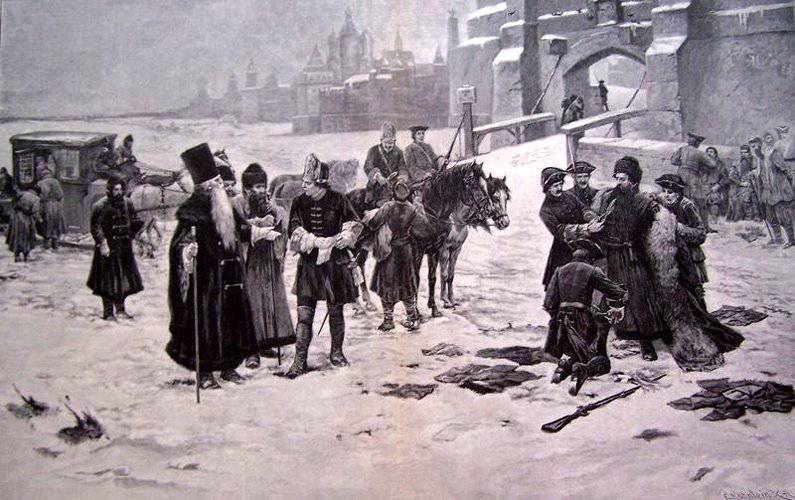
Peter's reforms (ban on beards and traditional clothing). G. Fon Urlaub
Petr Alekseevich was not the first Westerner in Russia. The Westernizers were Boris Godunov and Lzhedmitry I, and indeed almost all of the first Romanovs, slowly making the turn of Russian civilization to the West. The turn to the West was carried out by Queen Sophia and her favorite Vasily Golitsyn, who was an ardent Westernizer, and also (according to S. Solovyov), who was in special relations with the Jesuits. However, it was under Peter that the westernization of Russia became irreversible. Russian history entered the European direction, from which it was possible to escape only with the great blood of the 1917 disaster of the year. In 1991, the creeping westernization that has been going on since Khrushchev’s time has taken up again. And now Russia is once again at the "broken trough" open to the West, liberal Russia, which was ready to fulfill the role of an "energy power" - a raw materials appendage, while retaining some internal autonomy. People are beginning to understand that the West does not need any Russia - not a monarchist, with the nobility for which the first language is German, French or English, neither socialist nor democratic “energy power”.
The masters of the West have long established a strategic goal - the destruction of the Russian people, the main geopolitical opponent, the Western project being built by "New Babylon" and consistently go to the solution of this problem. Current events are only links of a long chain of a thousand-year confrontation between West and East.
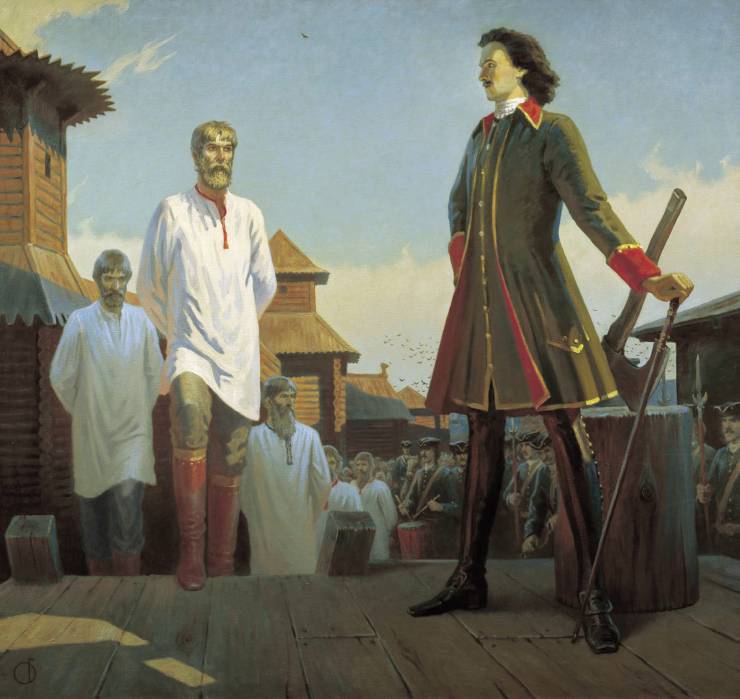
Stay away, sir, this is my place. Boris Olshansky
You should not blame Peter for all sins. He was not an absolutely negative figure in the history of Russia. The king broke a lot of wood, but did a lot for the benefit of a great power, he was not a traitor, he had a strategic vision. In the late period of his reign, Peter gradually began to correct mistakes, relied on national cadres and apparently could bring Russia still a lot of benefits. Therefore, his death is suspicious, it is possible that he was eliminated ...
As a result, the powerless mediators, who staged the orgy of palace coups, plundered, strolled and derailed the great projects of the king-reformer, received power. Much of the legacy of the Peter Empire was destroyed. However, thanks to the Russian patriots who began to receive education under Peter, Russia, albeit with mistakes, continued to grow. Degradation finally took up only during the First World War, when liberals, masons, aristocrats, bankers and generals killed the Russian Empire with their own hands.
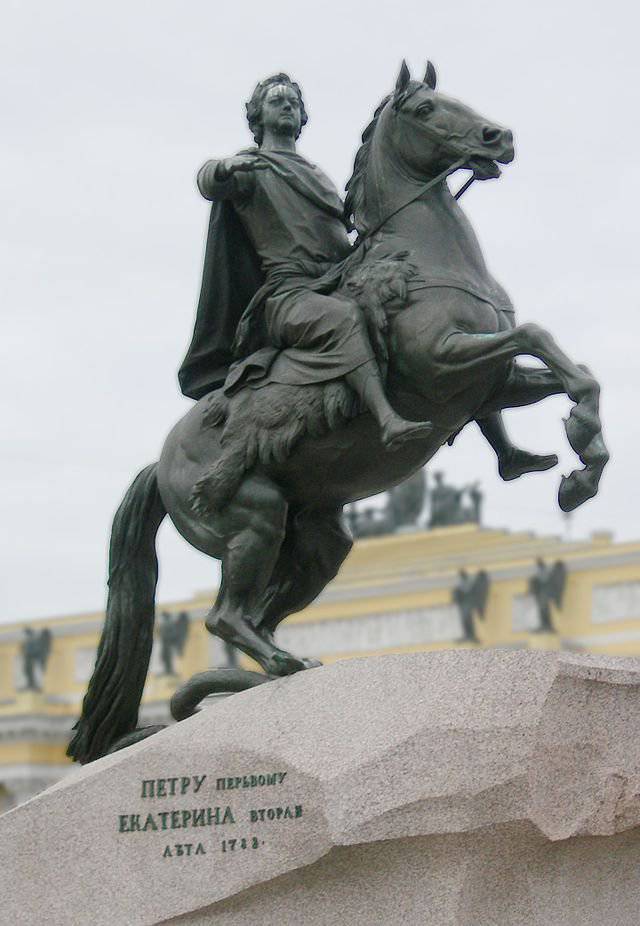
Bronze Horseman. Etienne Falcone
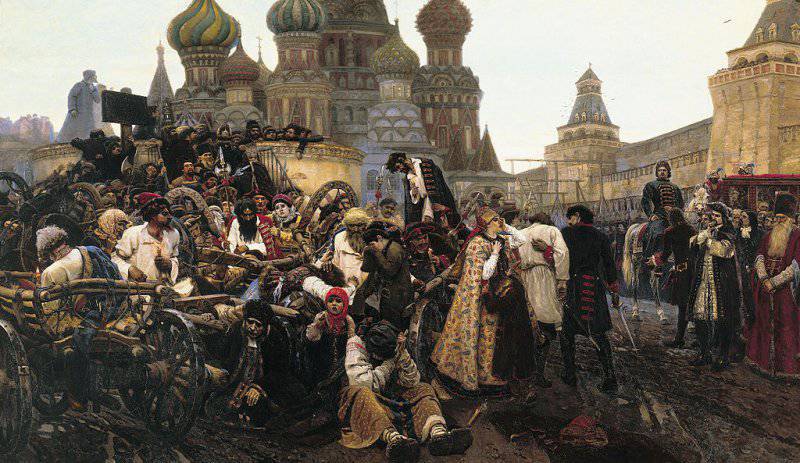
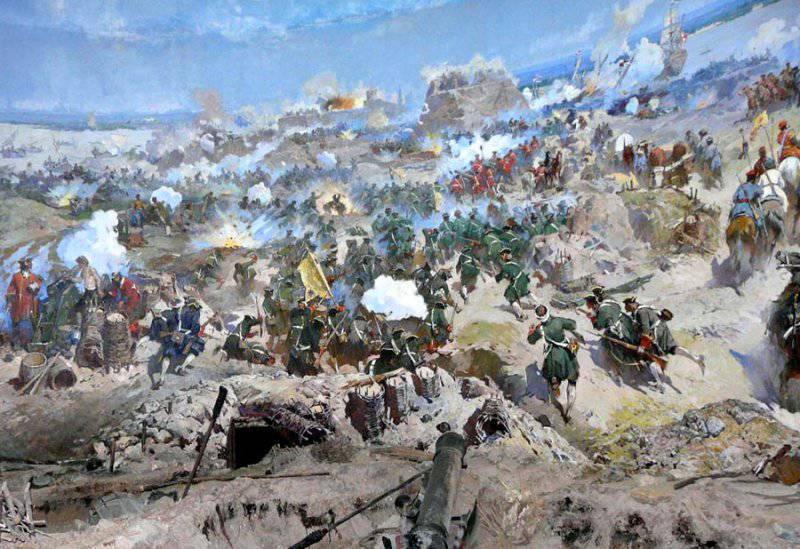
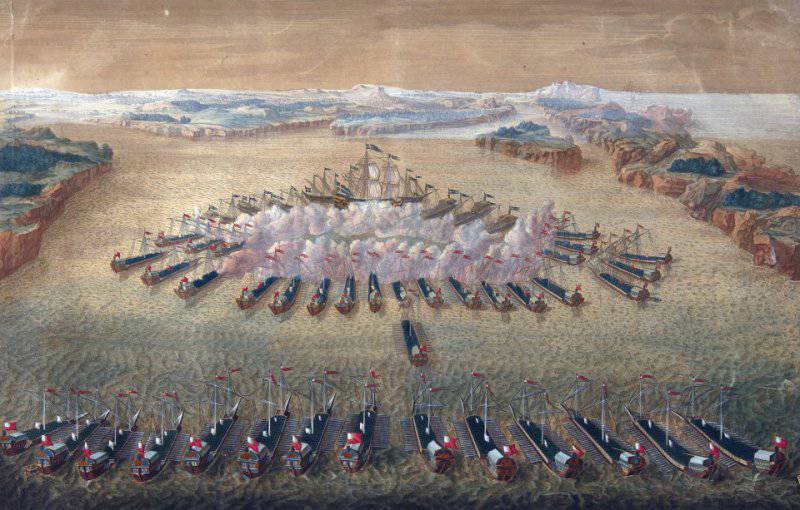
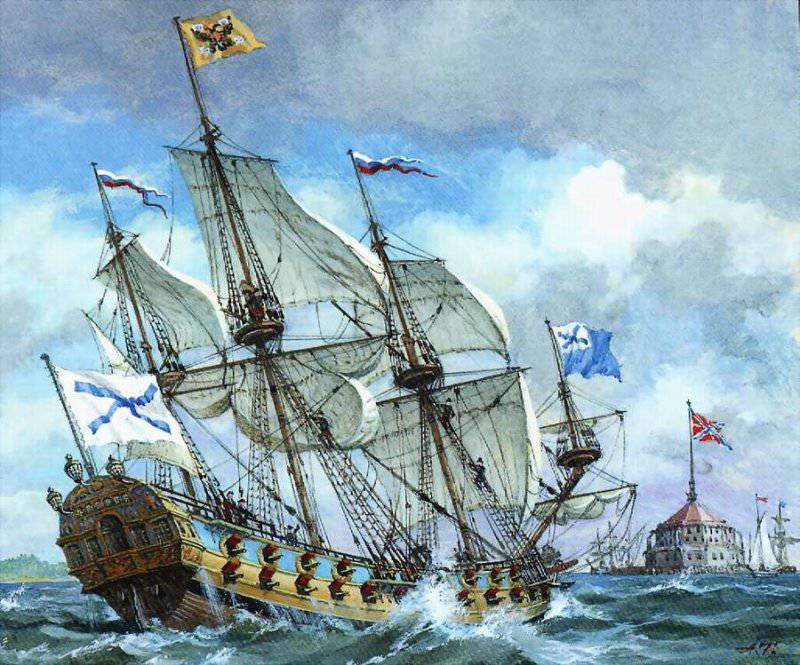
Information